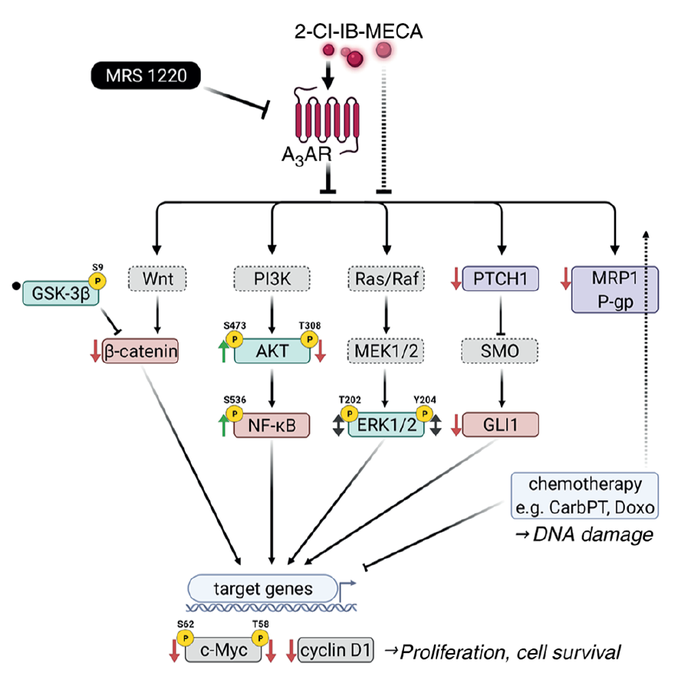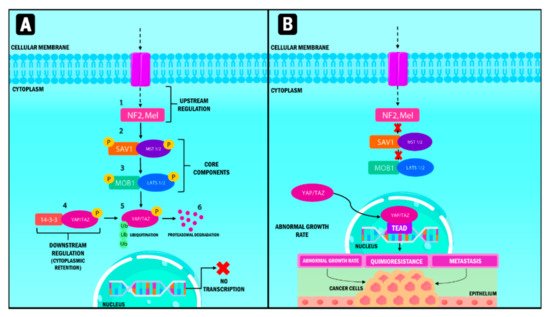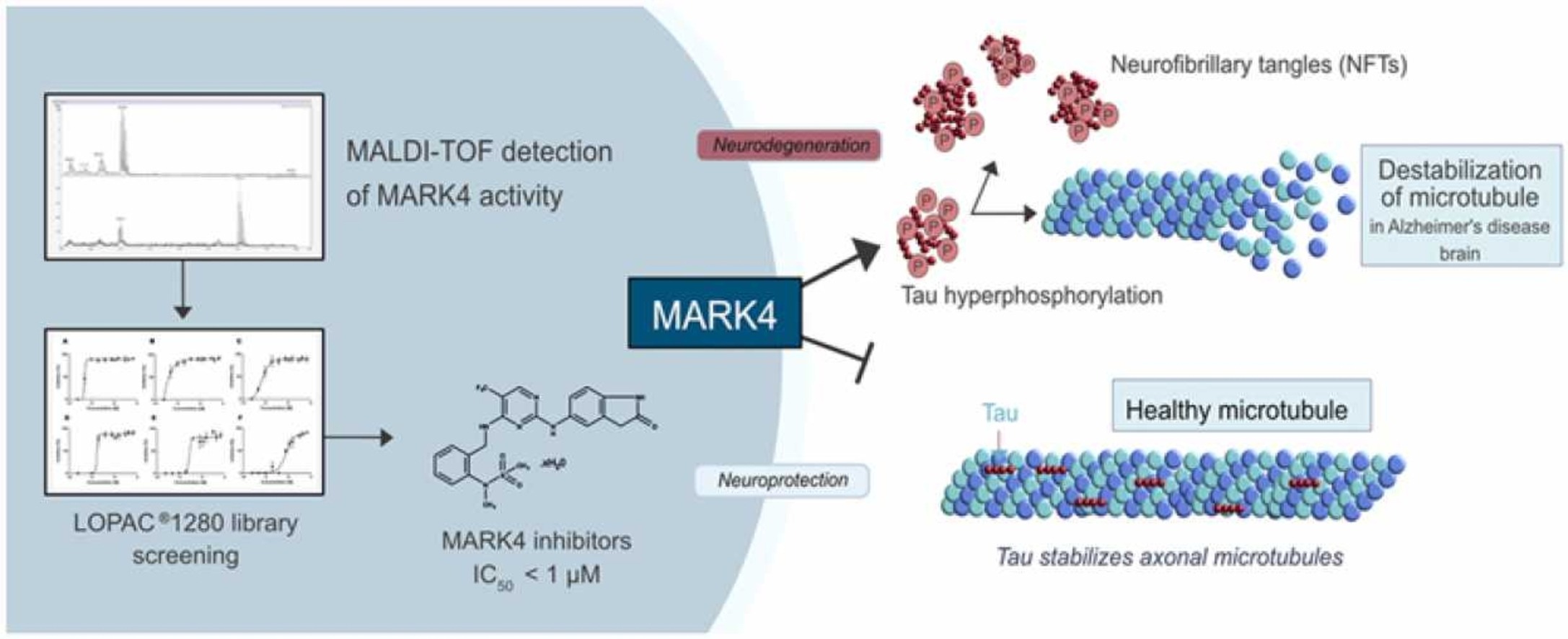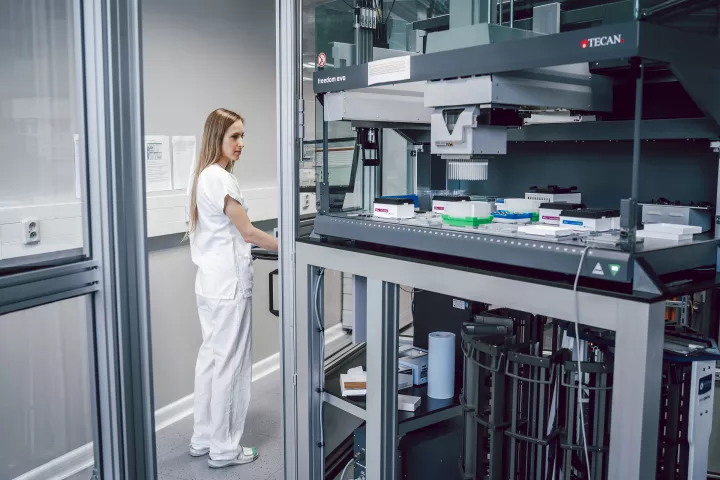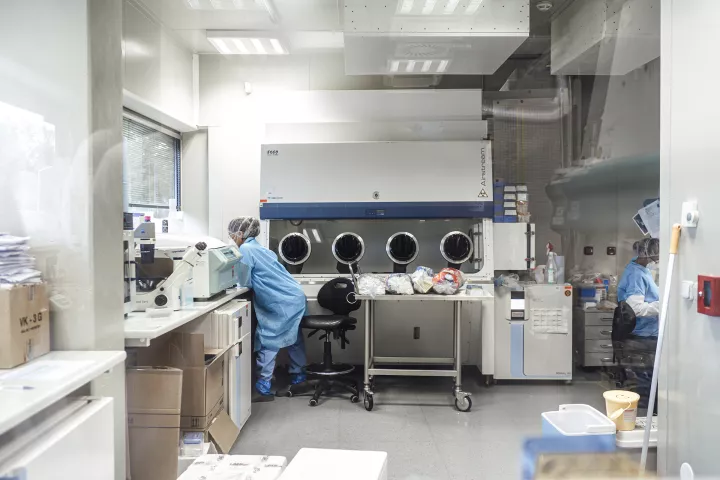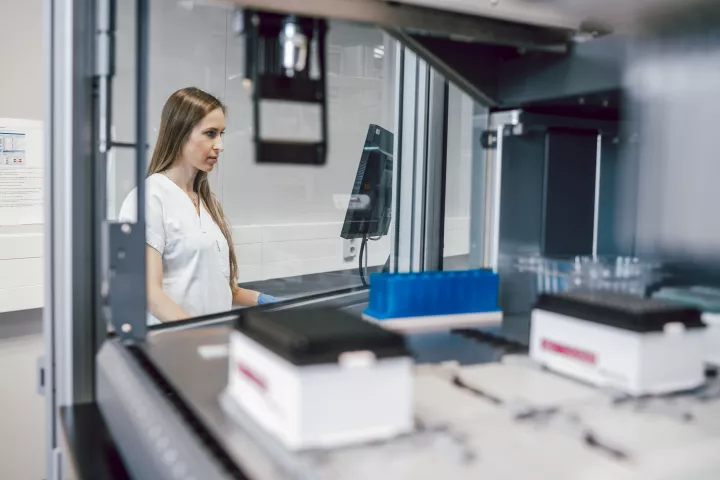
Molecular and personalized medicine
Group of Dr. Hajdúch is one of the pioneers of personalized medicine in the Czech Republic. We focus on the molecular basis of human diseases, especially cancer. We are involved in identification and description of metabolic and signaling pathways, genetic and epigenetic changes causing human cancers. This includes tumors of various origins and underlying mechanisms of carcinogenesis, including genetic tumor predisposition syndromes, infectious or inflammatory diseases. Our research generates new therapeutically exploitable molecular targets and biomarkers for the diagnosis and targeted treatment of human disorders.
In the field of drug research and development, the group focuses mainly on anticancer drugs, specifically small molecules, including natural compounds. We test the biological activity of synthesized chemical compounds, in the case of biologically active substances, we identify the mechanisms of action through the methods of cellular biology, biochemistry, chemical proteomics and genetics. In the case of known molecular targets, we perform high-throughput screening and screen for pharmacological inhibitors or activators of the biological activity of the molecular target or cellular phenotype. Furthermore, in collaboration with medicinal chemists we optimize the chemical structures to increase effectiveness and pharmacological properties of candidate molecules. Promising compounds enter pre-clinical testing and few of them proof-of-concept first in man or drug repurposing clinical trials.
In the field of biomarkers, we focus mainly on their identification, validation and implementation for diagnostic, prognostic and predictive purposes in cancer research and for routine clinical use. These biomarkers can be used in situations directly related to patient care, drug development and research. To this end, we leverage our expertise and knowledge in the identification and validation of biomarkers at the multiomic level through comprehensive profiling and analysis of the genome, transcriptome, proteome and metabolome. We perform comprehensive genomic, metabolic and proteomic analyses to find alterations of signaling and regulatory pathways in healthy versus tumor cells. Selected validated biomarkers are subsequently developed as diagnostic kits or directly licensed to industrial partners.
- Identification of new targets for antitumor drugs by studying molecular processes in cancer, infectious and rare diseases.
- Research and development of candidate drugs for cancer.
- Research and development of diagnostic, prognostic and predictive tumor biomarkers, especially with the use of non-invasive sampling techniques.
- Search for new translational models of human cancers in vitro and in vivo (tumor spheroids, organoids, patient derived tumor xenografts).
- Utilization and comprehensive processing of biomedical data, development of data stewardship tools and implementation of artificial intelligence methods for data analysis.
| Project: | Systems approaches to understanding aging and neurodegeneration |
|---|---|
| Supervisors: | Das Viswanath M.Sc., Ph.D. |
| Available: | 2 |
| Intended for: | Doctoral training |
| Project: | Role of axonal transport and pathology in neurodegeneration |
|---|---|
| Supervisors: | Das Viswanath M.Sc., Ph.D. |
| Available: | 2 |
| Intended for: | Doctoral training |
| Project: | New chemoinformatics approaches to fragment-based drug discovery |
|---|---|
| Supervisors: | Polishchuk Pavlo Ph.D., M.Sc. |
| Available: | 1 |
| Intended for: | Doctoral training |
| Project: | Research and development of agents for cancer, neurodegenerative and infectious diseases |
|---|---|
| Supervisors: | De Sanctis Juan Bautista Ph.D., Hajdúch Marián M.D., Ph.D., Džubák Petr M.D., Ph.D., Urban Milan Ph.D., Das Viswanath M.Sc., Ph.D. |
| Available: | 5 |
| Intended for: | Doctoral training |
| Project: | Research and development of agents for cancer, neurodegenerative and infectious diseases |
|---|---|
| Supervisors: | De Sanctis Juan Bautista Ph.D., Hajdúch Marián M.D., Ph.D., Džubák Petr M.D., Ph.D., Urban Milan Ph.D., Das Viswanath M.Sc., Ph.D. |
| Available: | 5 |
| Intended for: | Doctoral training |
| Project: | New methods in protein degradation |
|---|---|
| Supervisors: | Holub Dušan Ph.D., Hajdúch Marián M.D., Ph.D. |
| Available: | 2 |
| Intended for: | Doctoral training |
| Project: | Isolation and analysis of membrane lipid rafts using a non-targeted metabolomics and lipidomics approach |
|---|---|
| Supervisors: | Najdekr Lukáš Ph.D. |
| Available: | 1 |
| Intended for: | Doctoral training |
| Project: | Use of open-source software approaches for analysis of metabolomic and lipidomic clinical data |
|---|---|
| Supervisors: | Najdekr Lukáš Ph.D. |
| Available: | 1 |
| Intended for: | Doctoral training |
| Project: | Use of open-source software approaches for analysis of metabolomic and lipidomic clinical data |
|---|---|
| Supervisors: | Najdekr Lukáš Ph.D. |
| Available: | 1 |
| Intended for: | Doctoral training |
| Project: | Search and study of the mechanism of action of substances affecting the viability and motility of human spermatozoa |
|---|---|
| Supervisors: | Voller Jiří Ph.D. |
| Available: | 1 |
| Intended for: | Doctoral training |
| Project: | Search and study of the mechanism of action of new circadian rhythm modulators for the therapy of civilization diseases |
|---|---|
| Supervisors: | Voller Jiří Ph.D. |
| Available: | 1 |
| Intended for: | Doctoral training |
| Project: | Study of basic pharmacokinetic properties (ADME) of new drugs in preclinical development |
|---|---|
| Supervisors: | Lišková Barbora Ph.D. |
| Available: | 1 |
| Intended for: | Doctoral training |
| Project: | Identification of proteomic biomarkers in proximal fluids and tissues |
|---|---|
| Supervisors: | Džubák Petr M.D., Ph.D., Hajdúch Marián M.D., Ph.D. |
| Available: | 2 |
| Intended for: | Doctoral training |
| Project: | Preclinical development of molecular imaging agents |
|---|---|
| Supervisors: | Petřík Miloš Ph.D. |
| Available: | 2 |
| Intended for: | Doctoral training |
| Project: | Plasmonic nanomaterials in cancer theranostics |
|---|---|
| Supervisors: | Ranc Václav Ph.D., Petřík Miloš Ph.D. |
| Available: | 2 |
| Intended for: | Doctoral training |
| Project: | Synthesis and characterization of 2D nanoplatforms as active drug carriers |
|---|---|
| Supervisors: | Ranc Václav Ph.D., Hajdúch Marián M.D., Ph.D. |
| Available: | 3 |
| Intended for: | Doctoral training |
| Project: | Liquid biopsies in experimental and clinical oncology |
|---|---|
| Supervisors: | Srovnal Josef M.D., Ph.D., Koudeláková Vladimíra Ph.D. |
| Available: | 2 |
| Intended for: | Doctoral training |
| Project: | Ligand- and structure-based modeling of biologically active compounds |
|---|---|
| Supervisors: | Polishchuk Pavlo Ph.D., M.Sc. |
| Available: | 1 |
| Intended for: | Doctoral training |
| Project: | Multimodal imaging methods for preclinical testing of new bioactive molecules |
|---|---|
| Supervisors: | Nový Zbyněk Ph.D., Petřík Miloš Ph.D. |
| Available: | 2 |
| Intended for: | Doctoral training |
| Project: | Diagnosis and treatment of rare diseases |
|---|---|
| Supervisors: | Hajdúch Marián M.D., Ph.D., Srovnal Josef M.D., Ph.D. |
| Available: | 2 |
| Intended for: | Doctoral training |
| Project: | Modifications of biologically active molecules leading to improvement of their pharmacological properties |
|---|---|
| Supervisors: | Urban Milan Ph.D., Ranc Václav Ph.D., Polishchuk Pavlo Ph.D., M.Sc. |
| Available: | 3 |
| Intended for: | Doctoral training |
| Project: | Biologically active molecules and their therapeutic combinations |
|---|---|
| Supervisors: | Hajdúch Marián M.D., Ph.D. |
| Available: | 2 |
| Intended for: | Doctoral training |
| Project: | Physiology and pathophysiology of ageing |
|---|---|
| Supervisors: | Hajdúch Marián M.D., Ph.D., Voller Jiří Ph.D. |
| Available: | 2 |
| Intended for: | Doctoral training |
| Project: | Search and characterization of compounds for the therapy of congenital or acquired diseases caused by aberrant pre-mRNA editing |
|---|---|
| Supervisors: | Voller Jiří Ph.D. |
| Available: | 1 |
| Intended for: | Doctoral training |
| Project: | Bioinformatics processing of big data in clinical and preclinical studies |
|---|---|
| Supervisors: | Hajdúch Marián M.D., Ph.D., Pavliš Petr Ph.D., Vrbková Jana Ph.D. |
| Available: | 3 |
| Intended for: | Doctoral training |
| Project: | Anticancer drugs targeting nucleic acid metabolism |
|---|---|
| Supervisors: | Hajdúch Marián M.D., Ph.D., Džubák Petr M.D., Ph.D. |
| Available: | 2 |
| Intended for: | Doctoral training |
| Project: | Identification of proteomic biomarkers in exhaled breath condensate patients with systemic or pulmonary disease |
|---|---|
| Supervisors: | Džubák Petr M.D., Ph.D., Hajdúch Marián M.D., Ph.D. |
| Available: | 2 |
| Intended for: | Doctoral training |
| Project: | Development of 3D pharmacophore signatures and their application in anticancer drug design |
|---|---|
| Supervisors: | Polishchuk Pavlo Ph.D., M.Sc. |
| Available: | 1 |
| Intended for: | Doctoral training |
| Project: | Identification of molecular targets and resistance mechanisms of anticancer drugs by cell biology and proteomics methods |
|---|---|
| Supervisors: | Hajdúch Marián M.D., Ph.D., Džubák Petr M.D., Ph.D. |
| Available: | 2 |
| Intended for: | Doctoral training |
| Project: | Identification of molecular targets and resistance mechanisms of anticancer drugs by cell biology and proteomics methods |
|---|---|
| Supervisors: | Hajdúch Marián M.D., Ph.D., Džubák Petr M.D., Ph.D. |
| Available: | 2 |
| Intended for: | Doctoral training |
| Project: | Genetic and epigenetic biomarkers in health and disease |
|---|---|
| Supervisors: | Slavkovský Rastislav Ph.D., Džubák Petr M.D., Ph.D., Hajdúch Marián M.D., Ph.D., Drábek Jiří Ph.D., Koudeláková Vladimíra Ph.D. |
| Available: | 5 |
| Intended for: | Doctoral training |
| Project: | Diagnostics and therapy of rare diseases |
|---|---|
| Supervisors: | Hajdúch Marián M.D., Ph.D., Srovnal Josef M.D., Ph.D. |
| Available: | 2 |
| Intended for: | Doctoral training |
| Summary: | 2 places in full-time study |
| Project: | Drug development of small molecules |
|---|---|
| Supervisors: | Hajdúch Marián M.D., Ph.D. |
| Available: | 2 |
| Intended for: | Doctoral training |
| Summary: | 2 places in full-time study |
| Project: | Drug repurposing for treatment and prevention of diseases |
|---|---|
| Supervisors: | Hajdúch Marián M.D., Ph.D. |
| Available: | 1 |
| Intended for: | Doctoral training |
| Summary: | 1 place in full-time study |
| Project: | Drug repurposing for treatment and prevention of diseases |
|---|---|
| Supervisors: | Hajdúch Marián M.D., Ph.D. |
| Available: | 1 |
| Intended for: | Doctoral training |
| Summary: | 1 place in full-time study |
| Project: | Physiology and pathophysiology of aging |
|---|---|
| Supervisors: | Hajdúch Marián M.D., Ph.D., Voller Jiří Ph.D. |
| Available: | 2 |
| Intended for: | Doctoral training |
| Summary: | 2 places in full-time study |
| Project: | Identification of molecular targets and mechanisms of resistance in antitumor drugs using cell biology and proteomics methods |
|---|---|
| Supervisors: | Džubák Petr M.D., Ph.D., Hajdúch Marián M.D., Ph.D. |
| Available: | 2 |
| Intended for: | Doctoral training |
| Summary: | 2 places in full-time study |
| Project: | Search and characterization of substances for the therapy of congenital or acquired diseases caused by aberrant splicing of pre-mRNA |
|---|---|
| Supervisors: | Voller Jiří Ph.D. |
| Available: | 1 |
| Intended for: | Doctoral training |
| Summary: | 1 place in full-time study |
| Project: | Genetic and epigenetic biomarkers of cancer diseases |
|---|---|
| Supervisors: | Drábek Jiří Ph.D. |
| Available: | 1 |
| Intended for: | Doctoral training |
| Summary: | 1 place in full-time study |
| Project: | Bioinformatics processing of big data within clinical and preclinical studies |
|---|---|
| Supervisors: | Hajdúch Marián M.D., Ph.D., Pavliš Petr Ph.D. |
| Available: | 3 |
| Intended for: | Doctoral training |
| Summary: | 3 places in full-time or combined form of study |
| Project: | Antitumor drugs targeting nucleic acid metabolism |
|---|---|
| Supervisors: | Džubák Petr M.D., Ph.D., Hajdúch Marián M.D., Ph.D. |
| Available: | 2 |
| Intended for: | Doctoral training |
| Summary: | 2 places in full-time study |
| Project: | Identification of proteomic biomarkers in exhaled air condensate in patients with systemic or pulmonary disease |
|---|---|
| Supervisors: | Džubák Petr M.D., Ph.D., Hajdúch Marián M.D., Ph.D. |
| Available: | 2 |
| Intended for: | Doctoral training |
| Summary: | 2 places in full-time study |
| Project: | The role of tumor hypoxia in the development of acquired resistance to microtubule-targeted drugs |
|---|---|
| Supervisors: | Das Viswanath M.Sc., Ph.D. |
| Available: | 1 |
| Intended for: | Doctoral training |
| Summary: | 1 place in full-time study |
| Project: | The role of tumor hypoxia in the development of acquired resistance to microtubule-targeted drugs |
|---|---|
| Supervisors: | Das Viswanath M.Sc., Ph.D. |
| Available: | 1 |
| Intended for: | Doctoral training |
| Summary: | 1 place in full-time study |
| Project: | Biochemical and cellular analysis of amyloid staining agents in models of tauopathies and synucleopathies |
|---|---|
| Supervisors: | Das Viswanath M.Sc., Ph.D. |
| Available: | 2 |
| Intended for: | Bachelor training |
| Project: | Development of organoid assays for anti-tumour drug screening |
|---|---|
| Supervisors: | Das Viswanath M.Sc., Ph.D. |
| Available: | 2 |
| Intended for: | Bachelor training |
| Project: | Drug synergy studies in 3D spheroids cultures of tumour cell lines |
|---|---|
| Supervisors: | Das Viswanath M.Sc., Ph.D. |
| Available: | 2 |
| Intended for: | Bachelor training |
| Project: | Bio- and cheminformatics in biology of aging |
|---|---|
| Supervisors: | Voller Jiří Ph.D. |
| Available: | 1 |
| Intended for: | Doctoral training |
| Summary: | Although hundreds of biological databases are available, a richly annotated database of anti-aging compounds with diverse mechanisms of action has been missing. The aim of the project is to create a database of compounds with anti-aging activity that would offer a rich annotation of both compound and involved biological mechanisms. The data will be collected from a wide range of public databases, by text-mining of scientific literature and patents as well as from results of in-house high-throughput screening. The data will be used for formulation of new hypotheses of mechanisms of aging as well as for identification of novel anti-aging compounds. |
| Project: | Pharmacokinetic methods in preclinical drug testing |
|---|---|
| Supervisors: | Hajdúch Marián M.D., Ph.D., Lišková Barbora Ph.D. |
| Available: | 1 |
| Intended for: | Doctoral training |
| Summary: | The study of ADME properties of a potential drug that are part of the IMTM chemical library - obtained by national or international cooperation belongs to one of the first steps in predicting potential drugs. In vitro models generate many ADME parameters, including chemical, plasma and microsomal stability, plasma protein binding and proportion of passive diffusion as a transport mechanism. The Caco-2 and MDCK-MDR1 permeability assays are established models of intestinal and blood-brain barriers, respectively. Analysis of samples is performed using a Agilent RapidFire 300 - rapid online solid phase extraction with subsequent detection of the mass spectrometer Qtrap 5500 (AB Sciex) - RF/MS. High-Throughput Mass Spectrometry System RF/MS delivers ultrafast, label – free analysis of native compounds for biochemical assays in ADME and provide throughput speeds of 6 to 10 seconds per sample. |
| Project: | A combination of 2D and 3D cell cultures for a smart and effective identification and characterization of anti-hypoxic candidates |
|---|---|
| Supervisors: | Das Viswanath M.Sc., Ph.D. |
| Available: | 1 |
| Intended for: | Doctoral training |
| Summary: | Hypoxia is a prominent feature of different solid tumor types. A central component of hypoxic adaptation is the stabilization of hypoxia-inducible factor-1 (HIF-1), a key transcriptional regulator of hypoxia that orchestrates the transcriptional regulation of genes involved in a plethora of cellular processes. Considering the multiple roles of HIF-1 in cancer, interest in novel small-molecule inhibitors of the HIF-1 pathway has steadily increased over the past 10 years. However, despite extensive research, no specific inhibitor of HIF-1 has been brought to the market, making the field still ripe for further exploration. The goal of the present work is to utilize the potential of a combination of 2D and 3D cellular models for identification and characterization of inhibitors of HIF-1 and/or HIF-1 pathway by screening in 2D cultures, and lightsheet microscopy and mass spectrometry studies in spheroid cultures. |
| Project: | Screening and characterization of compounds for therapy of diseases caused by aberrant pre-mRNA splicing |
|---|---|
| Supervisors: | Voller Jiří Ph.D. |
| Available: | 1 |
| Intended for: | Doctoral training |
| Summary: | Recently, we identified several novel modulators of alternative splicing with the ability to increase expression of wild-type transcripts of several genes relevant for neurodegeneration or cancer. However, mechanisms of action of those promising compounds remains unclear. The aim of the project is to (i) identify molecular targets and relevant pathways, (ii) design assays for high-througput screening of a library of chemical compounds, and (iii) to identify novel structural types of active compounds. |
| Project: | Screening and characterization of compounds for therapy of mitochondrial and metabolic disorders |
|---|---|
| Supervisors: | Voller Jiří Ph.D. |
| Available: | 1 |
| Intended for: | Doctoral training |
| Summary: | Pharmacotherapy of hereditary mitochondrial diseases including neurodegenerations and cardiopathies is only symptomatical at present. The aim of this study is to identify the novel candidate drugs by high-throughput screening using patient-derived cell lines. The assays will evaluate survival under metabolic and oxidative stress as well as morphology and function of mitochondria. Mechanism of action of promising compounds will be studied by OMICS methods. |
| Project: | Drug resistance mechanisms in cancer |
|---|---|
| Supervisors: | Džubák Petr M.D., Ph.D., Hajdúch Marián M.D., Ph.D. |
| Available: | 2 |
| Intended for: | Doctoral training |
| Summary: | Mechanisms of tumor cell resistance to newly developed and existing nucleoside analog cytostatics will be studied. These drugs are used in most anti-cancer therapy protocols and the emergence of drug resistance is a major problem in the treatment of cancer patients. Resistant cell lines prepared in the past will be studied to identify the key mechanisms of resistance, which will be carried out by their detailed characterization using cell biology, but also proteomics and molecular genetics. The significance of the identified changes will be further verified on clinical material and will be applied in the development of new anticancer drugs from this class. |
| Project: | The role of tumor hypoxia in the acquisition of resistance to microtubule-targeting drugs |
|---|---|
| Supervisors: | Das Viswanath M.Sc., Ph.D. |
| Available: | 1 |
| Intended for: | Doctoral training |
| Summary: | Hypoxia is one of the major factors causing resistance to microtubule-stabilizing drugs (MSDs) and other non-microtubule drugs used in chemotherapy. Hypoxia results in changes in tubulin conformation, expression of tubulin isotypes and metabolic pathways that make cancer cells less susceptible to paclitaxel, a taxane used extensively in the treatment of solid tumors. Recent cellular studies have shown that non-taxane MSDs with a similar mode of microtubule stabilization to paclitaxel is more effective in hypoxic cancer cells than paclitaxel. Due to a different microtubule-binding site, we hypothesize that non-taxane MSDs may have a better cytotoxic effect in cancer cells under hypoxia. The goal of this project is to study the anti-cancer effect of non-taxane MSDs in hypoxic ovarian and cervical cancer cell models. |
| Project: | Identification of molecular targets of anticancer therapy applying cell biology and proteomics tools |
|---|---|
| Supervisors: | Džubák Petr M.D., Ph.D., Hajdúch Marián M.D., Ph.D. |
| Available: | 2 |
| Intended for: | Doctoral training |
| Summary: | Selected, highly active derivatives of triterpenes, chelators and nucleosides will be studied with a view to identify the mechanisms of their antitumor effects. Advanced methods of cell biology, proteomics and genomics such as affinity purification of protein targets, CETSA and others will be used for their study. The identified targets will be validated in relation to their clinical relevance in anticancer therapy. |
| Project: | Pathological conditions associated with human papillomavirus infection |
|---|---|
| Supervisors: | Koudeláková Vladimíra Ph.D., Hajdúch Marián M.D., Ph.D. |
| Available: | 2 |
| Intended for: | Doctoral training |
| Summary: | High-risk human papillomavirus infection (HPV infection) is associated with several cancers such as cervical, vaginal, vulvar, head and neck, anal, and penile carcinomas. Nearly all cervical cancers are caused by HPV infection. Despite available vaccination and cervical cancer screening program, cervical cancer is one of the most common types of cancer affecting women worldwide. Main problems of cervical cancer screening are low participation rate and low sensitivity of cytology which is still used in the majority of cervical cancer screening programs. Solution could be the transition to primary HPV screening and the sending of self-sampling devices to cervical cancer screening non-attenders. The best strategy for enrolling Czech women in the screening program will be analysed during this project. Obtained samples will be tested for the presence of HPV DNA and the presence of other molecular biomarkers important in viral clearance and cervical cancer progression/regression. Discoveries will lead to identification of biomarkers for early diagnosis, disease progression or triage strategies. The aim of the project is to clarify the best strategy for enrolling women who do not attend cervical cancer screening program. The second aim is to study genetic and proteomic profile of HPV positive/negative women with normal/abnormal cervical cytology as well as genetic variants of HPV and its importance for regression/progression of the disease. Skills to be taught include biochemistry, molecular biology, bioinformatics and cell culture. This is an ideal project for a student who wishes to pursue higher studies in cancer research. The project will use various techniques including PCR, in situ hybridization, next generation sequencing, mass spectrometry. |
| Project: | An extensive structural and biochemical characterization of tau oligomeric species in Alzheimer’s disease and other tauopathies |
|---|---|
| Supervisors: | Das Viswanath M.Sc., Ph.D. |
| Available: | 1 |
| Intended for: | Doctoral training |
| Summary: | An extensive structural and biochemical characterization of tau oligomeric species in Alzheimer’s disease and other tauopathies |
| Project: | Identification of pro-longevity pathways and mechanisms of model organisms |
|---|---|
| Supervisors: | Voller Jiří Ph.D. |
| Available: | 1 |
| Intended for: | Doctoral training |
| Summary: | The aim of the project is to identify the novel compounds which can increase life-span of C. elegans, increase their resistance against stress and neurodegeneration, using high-throughput and high-content screening platforms. Active compounds will be further studied in human cell cultures. Mechanisms of action of interesting hits will be studied by OMICS |
| Project: | Biology of aging and DNA damage |
|---|---|
| Supervisors: | Hajdúch Marián M.D., Ph.D. |
| Available: | 1 |
| Intended for: | Doctoral training |
| Project: | Identification of proteomic biomarkers in exhaled breath condensate in patients with systemic or pulmonary disease |
|---|---|
| Supervisors: | Džubák Petr M.D., Ph.D., Hajdúch Marián M.D., Ph.D. |
| Available: | 2 |
| Intended for: | Doctoral training |
| Summary: | Ph.D. topic is focused on the identification of biomarkers of lung diseases by means of a non-invasive collection of exhaled breath condensate. The project will monitor the presence of proteins in exhaled air in various diseases such as asthma, cystic fibrosis, lung tumors, or some infectious diseases, as well as quantitative changes of these proteins compared to a healthy population. Changes in these potential biomarkers with respect to therapeutic response and disease progression will be evaluated and validated. |
| Project: | Genetic and epigenetic biomarkers in cancer |
|---|---|
| Supervisors: | Drábek Jiří Ph.D., Slavkovský Rastislav Ph.D., Hajdúch Marián M.D., Ph.D. |
| Available: | 3 |
| Intended for: | Doctoral training |
| Summary: | Clonal hematopoiesis of indeterminate potential (CHIP) has recently been described as a common phenomenon associated with aging. It is characterized by the accumulation of somatic mutations in cells of the hematopoietic system. Although CHIP is manifested by the expansion of certain cell clones, this condition is not accompanied by any morphological features of hematological neoplasia. However, it has been shown that the incidence of clonal hematopoiesis correlates with increased overall mortality and the risk of developing malignant transformation of hematopoietic cells as well as cardiovascular disease, such as ischemic stroke. To what extent and by what mechanisms clonal hematopoiesis contributes to disease development remains a question of current research. The main aim of the project will be to pinpoint the principal cells carrying CHIP somatic mutations, and to study their role in development and maintenance of atherosclerotic plaques, especially of those involved in development of stroke. The comparison of the phenotype of CHIP positive and negative cells will be of special interest. The use of cellular models not only include different types of leucocytes but circulatory progenitor endothelial cells as well. The study will involve elderly subjects with the positive presence of CHIP (>65 years). Subject will be characterized based on the presence or absence of ischemic stroke and the presence or absence of carotid stenosis by our clinical collaborators. The presence of somatic variants in 38 selected genes associated with CHIP will be tested in subjects of interest within our research group. The project will use various techiques including FACS, MACS, cell cultures, DNA isolation from small amount of cells, a highly sensitive sequencing method for DNA genotyping allowing detection of variant with less than 1% allelic frequency, DNA/RNA sequencing library preparation, deep massively parallel sequencing of panel of genes using unique molecular barcodes/indices, RNAseq, bioinformatics and data analysis with possibilities of calculations using high performance computing cluster, data management and statistical evaluation. |
| Project: | New prognostic and predictive factors in solid tumors |
|---|---|
| Supervisors: | Srovnal Josef M.D., Ph.D., Hajdúch Marián M.D., Ph.D. |
| Available: | 2 |
| Intended for: | Doctoral training |
| Summary: | Cancer is the second leading cause of death in the western countries. Early diagnosis and targeted therapy improve the therapeutic outcome. With the emergence of new biotechnologies, diagnosis can be made early and precisely, and the knowledge of tumor molecular genetics can identify the most appropriate therapy for a particular patient. The sensitivity of modern molecular methods makes it possible to characterize the tumor properties from sites remote from the primary tumor using patient's blood. The subject of the offered study program is the identification of new prognostic and predictive biomarkers of cancer using liquid biopsies. This is particularly the analysis of circulating tumor cells (CTCs), circulating free tumor DNA (ctDNA) and circulating miRNAs. The aim of the project is to further implement a liquid biopsy concept into the diagnosis and therapy monitoring of solid tumors, especially colorectal, breast, lung and CNS tumors. These include therapy response and resistance monitoring, identifying new therapeutic targets and estimating disease prognosis. The project will provide training in widely-used, transferable techniques, including circulation tumor cells capture system, digital droplet PCR, reverse-transcription qPCR, RNA-seq, single cell analyses, xenografts models and other multi-omics methods. We are looking for candidates with a background in Molecular Biology, Medicine, Cell Biology or a related area, who are enthusiastic about investigating novel approaches in cancer diagnostic that have significant potential for public health. |
| Project: | New prognostic and predictive factors in solid tumors |
|---|---|
| Supervisors: | Srovnal Josef M.D., Ph.D., Hajdúch Marián M.D., Ph.D. |
| Available: | 2 |
| Intended for: | Doctoral training |
| Summary: | Cancer is the second leading cause of death in the western countries. Early diagnosis and targeted therapy improve the therapeutic outcome. With the emergence of new biotechnologies, diagnosis can be made early and precisely, and the knowledge of tumor molecular genetics can identify the most appropriate therapy for a particular patient. The sensitivity of modern molecular methods makes it possible to characterize the tumor properties from sites remote from the primary tumor using patient's blood. The subject of the offered study program is the identification of new prognostic and predictive biomarkers of cancer using liquid biopsies. This is particularly the analysis of circulating tumor cells (CTCs), circulating free tumor DNA (ctDNA) and circulating miRNAs. The aim of the project is to further implement a liquid biopsy concept into the diagnosis and therapy monitoring of solid tumors, especially colorectal, breast, lung and CNS tumors. These include therapy response and resistance monitoring, identifying new therapeutic targets and estimating disease prognosis. The project will provide training in widely-used, transferable techniques, including circulation tumor cells capture system, digital droplet PCR, reverse-transcription qPCR, RNA-seq, single cell analyses, xenografts models and other multi-omics methods. We are looking for candidates with a background in Molecular Biology, Medicine, Cell Biology or a related area, who are enthusiastic about investigating novel approaches in cancer diagnostic that have significant potential for public health. |
| Project: | New prognostic and predictive factors in solid tumors |
|---|---|
| Supervisors: | Srovnal Josef M.D., Ph.D., Hajdúch Marián M.D., Ph.D. |
| Available: | 2 |
| Intended for: | Doctoral training |
| Summary: | Cancer is the second leading cause of death in the western countries. Early diagnosis and targeted therapy improve the therapeutic outcome. With the emergence of new biotechnologies, diagnosis can be made early and precisely, and the knowledge of tumor molecular genetics can identify the most appropriate therapy for a particular patient. The sensitivity of modern molecular methods makes it possible to characterize the tumor properties from sites remote from the primary tumor using patient's blood. The subject of the offered study program is the identification of new prognostic and predictive biomarkers of cancer using liquid biopsies. This is particularly the analysis of circulating tumor cells (CTCs), circulating free tumor DNA (ctDNA) and circulating miRNAs. The aim of the project is to further implement a liquid biopsy concept into the diagnosis and therapy monitoring of solid tumors, especially colorectal, breast, lung and CNS tumors. These include therapy response and resistance monitoring, identifying new therapeutic targets and estimating disease prognosis. The project will provide training in widely-used, transferable techniques, including circulation tumor cells capture system, digital droplet PCR, reverse-transcription qPCR, RNA-seq, single cell analyses, xenografts models and other multi-omics methods. We are looking for candidates with a background in Molecular Biology, Medicine, Cell Biology or a related area, who are enthusiastic about investigating novel approaches in cancer diagnostic that have significant potential for public health. |
| Project: | Identification of novel proteomic cancer biomarkers |
|---|---|
| Supervisors: | Hajdúch Marián M.D., Ph.D. |
| Available: | 2 |
| Intended for: | Doctoral training |
